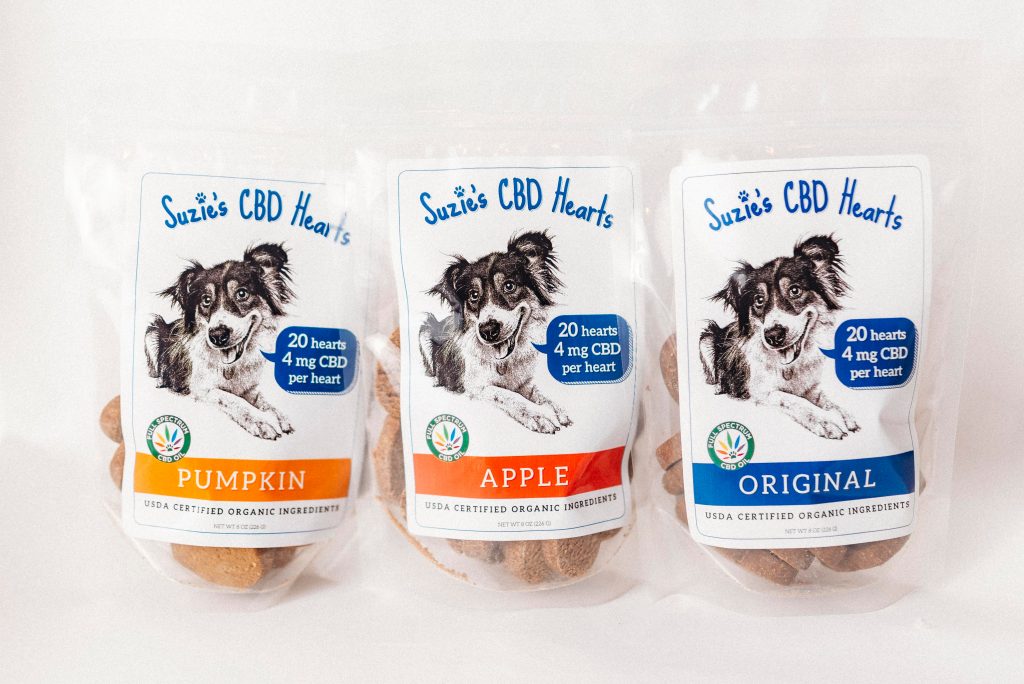
There are many reasons that a pet may experience anxiety. Sudden environmental changes such as moving to a new home, adjusting to new people or other pets, fear of loud noises such as fireworks or the vacuum cleaner, separation anxiety, trips to the vet. Rescue animals struggling with PTSD symptoms.
And this is where CBD can help.
CBD stands for cannabidiol. It’s one of over 100 compounds found in hemp and cannabis plants. While THC, or Tetrahydrocannabinol, is the prominent cannabinoid found in cannabis, it is psychoactive while CBD is not. Because CBD is not psychoactive, its calming effects are a well-known treatment for many anxiety symptoms.
Most CBD products are not made from cannabis plants, but by extracting CBD from industrial hemp plants and diluting it with an oil like coconut oil, and, because of this, there is virtually no THC level or risk of getting your dog or cat high. This leaves your furry friend with a sense of relaxation and potentially an increased appetite.
This also makes CBD ideal for those who are only looking for relief from allergies and pain, especially complications from arthritis and ailments such as skin issues.
CBD oil may even lessen the frequency of seizures in animals with epilepsy.
The only FDA-approved CBD medication is prescribed to humans to help prevent seizures. According to a small study done by Colorado State University in 2016 to 2017, the CBD clinical trial results on reducing seizure frequency in dogs were found “promising and exciting” by Dr. Stephanie McGrath, a neurologist at CSU’s James L. Voss Veterinary Teaching Hospital.
Out of 16 pet dogs that participated in the study, nine were treated with CBD and seven were given a placebo. The study found that 89 percent of the dogs who received the CBD treatment, in addition to their standard anticonvulsant drugs, experienced a distinct reduction in the frequency of seizures.
Idiopathic generalized epilepsy affects up to 5.7 percent of the pet dog population and is considered the most common canine neurological condition. Dr. McGrath believes “it’s really exciting that perhaps we can start looking at CBD in the future as an alternative to existing anticonvulsive drugs.”
Almost 60 percent of the pet dog population will also experience arthritis. According to the Mayo Clinic, one in four pet dogs will be diagnosed with some form of arthritis during their lifetime. Hemp CBD oils can offer anti-inflammatory effects and may be able to provide pain relief for dogs, or any pet, dealing with arthritis.
It’s recommended to start small and provide your pets with enough food and water to help counteract any dry mouth and lightheadedness.
High doses of CBD can potentially cause lowered blood pressure in animals but, just like any medication meant for pets, it depends on the animal’s weight. Even though the Endocannabinoid System (ECS) is said to function the same way in dogs, cats, and other mammals as it does in people, there is still more research to be done.
CBD oil is not currently recommended for very small animals or pocket pets, such as guinea pigs and hamsters, due to overdosing risks. After all, the heart of a seven-pound dog is still much larger than that of a hamster.
Gary Richter, medical director of Montclair Veterinary Hospital and Holistic Veterinary Care in Oakland, California, says, “I think the bigger issue, from a medical perspective, is making sure that animals are dosed appropriately. This means that the CBD oil is having the effect you want it to have, and that you’re not accidentally overdosing.”
So while CBD oil is generally considered safe and beneficial for dogs and cats, it’s always best to consult with a vet regarding dosage, frequency, and CBD oil usage with other medications.

There are many reasons that a pet may experience anxiety. Sudden environmental changes such as moving to a new home, adjusting to new people or other pets, fear of loud noises such as fireworks or the vacuum cleaner, separation anxiety, trips to the vet. Rescue animals struggling with PTSD symptoms.
And this is where CBD can help.
CBD stands for cannabidiol. It’s one of over 100 compounds found in hemp and cannabis plants. While THC, or Tetrahydrocannabinol, is the prominent cannabinoid found in cannabis, it is psychoactive while CBD is not. Because CBD is not psychoactive, its calming effects are a well-known treatment for many anxiety symptoms.
Most CBD products are not made from cannabis plants, but by extracting CBD from industrial hemp plants and diluting it with an oil like coconut oil, and, because of this, there is virtually no THC level or risk of getting your dog or cat high. This leaves your furry friend with a sense of relaxation and potentially an increased appetite.
This also makes CBD ideal for those who are only looking for relief from allergies and pain, especially complications from arthritis and ailments such as skin issues.
CBD oil may even lessen the frequency of seizures in animals with epilepsy.
The only FDA-approved CBD medication is prescribed to humans to help prevent seizures. According to a small study done by Colorado State University in 2016 to 2017, the CBD clinical trial results on reducing seizure frequency in dogs were found “promising and exciting” by Dr. Stephanie McGrath, a neurologist at CSU’s James L. Voss Veterinary Teaching Hospital.
Out of 16 pet dogs that participated in the study, nine were treated with CBD and seven were given a placebo. The study found that 89 percent of the dogs who received the CBD treatment, in addition to their standard anticonvulsant drugs, experienced a distinct reduction in the frequency of seizures.
Idiopathic generalized epilepsy affects up to 5.7 percent of the pet dog population and is considered the most common canine neurological condition. Dr. McGrath believes “it’s really exciting that perhaps we can start looking at CBD in the future as an alternative to existing anticonvulsive drugs.”
Almost 60 percent of the pet dog population will also experience arthritis. According to the Mayo Clinic, one in four pet dogs will be diagnosed with some form of arthritis during their lifetime. Hemp CBD oils can offer anti-inflammatory effects and may be able to provide pain relief for dogs, or any pet, dealing with arthritis.
It’s recommended to start small and provide your pets with enough food and water to help counteract any dry mouth and lightheadedness.
High doses of CBD can potentially cause lowered blood pressure in animals but, just like any medication meant for pets, it depends on the animal’s weight. Even though the Endocannabinoid System (ECS) is said to function the same way in dogs, cats, and other mammals as it does in people, there is still more research to be done.
CBD oil is not currently recommended for very small animals or pocket pets, such as guinea pigs and hamsters, due to overdosing risks. After all, the heart of a seven-pound dog is still much larger than that of a hamster.
Gary Richter, medical director of Montclair Veterinary Hospital and Holistic Veterinary Care in Oakland, California, says, “I think the bigger issue, from a medical perspective, is making sure that animals are dosed appropriately. This means that the CBD oil is having the effect you want it to have, and that you’re not accidentally overdosing.”
So while CBD oil is generally considered safe and beneficial for dogs and cats, it’s always best to consult with a vet regarding dosage, frequency, and CBD oil usage with other medications.



